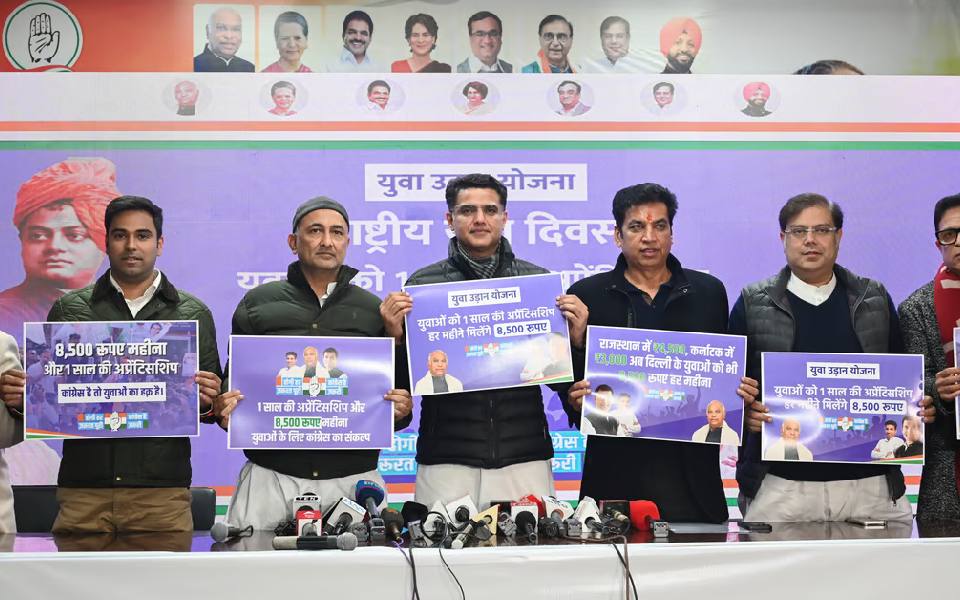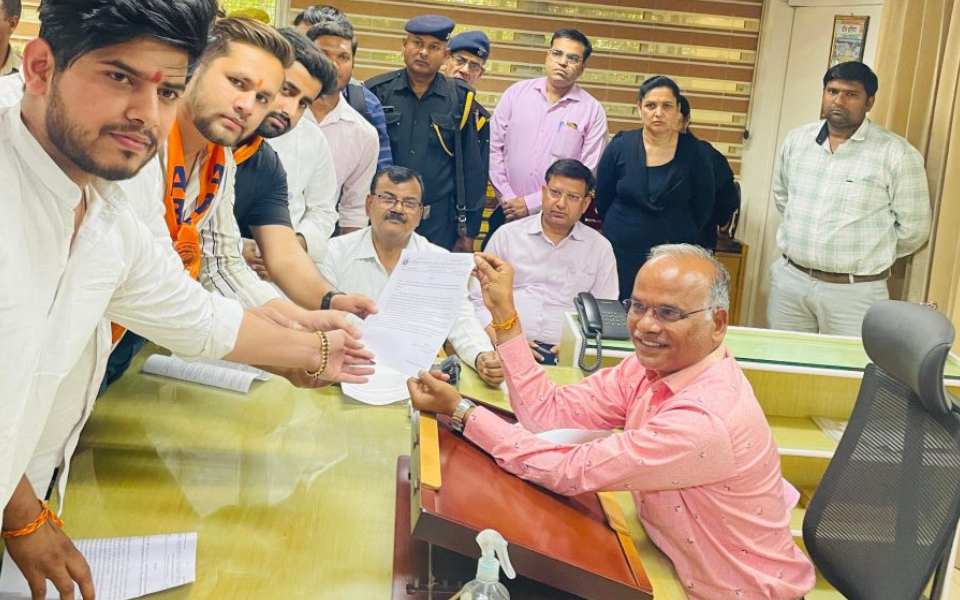New Delhi, Jan 12: The Congress on Sunday promised to give Rs 8,500 every month to educated unemployed youths in Delhi for one year if it comes to power in Delhi.
This is the third scheme launched by the Congress ahead of the Delhi Assembly polls.
The financial assistance will be provided under the 'Yuva Udaan Yojana' and it is not free, AICC general secretary Sachin Pilot said at a press conference.
"We will provide financial assistance to youths who can show their skills in a company, factory or organisation. They will get money through these companies. This is not a scheme under which one will get money while sitting at home," Pilot said.
"This help will not be just financial. We will try that people are absorbed in those fields where they have received training... so that they can... improve their skill set," he said.
He alleged that the BJP and the Aam Aadmi Party had totally ignored the youth in the past 11 years when they were busy building the “Raj Mahal” and “Sheesh Mahal”, respectively.
During the press conference, AICC Delhi in-charge Qazi Nizamuddin, Delhi Congress president Devender Yadav and NSUI, Congress’ student wing, president Varun Chaudhary were also present.
“We will encourage them to work in the companies or factories and we will help you. So we will try to give via companies. This is not a scheme to give allowance to people sitting at home.
“Yes, this is a guarantee that if there is a person who is not able to be absorbed in any factory or company, then we are ready to bear. This is an encouragement for one year so that they can stand on their feet,” Pilot said.
Pilot said that Congress’ guarantee was the best tribute to Swami Vivekananda on his birth anniversary, which is celebrated as the 'National Youth Day'.
The leaders also launched the poster of the scheme during the press conference.
“I have full confidence that on February 5, people will give the Congress a chance to serve in the national capital with a good majority,” he stated.
He said that while the government will provide the funds, private companies will engage the registered youths to develop their skills and absorb them, or for the youth to start their own ventures.
Yadav said that the Congress stipend will channelise the skills of the youth to constructive work, to give direction to their lives, as in the past 11 years, people only witnessed “monopoly, price rise and corruption” but no jobs for the youth.
“The Congress government had turned Delhi into a world class city, but now lawlessness and joblessness rule the roost. When the Congress comes to power, all needs of the people will be fulfilled,” he added.
On January 6, the Congress announced the 'Pyaari Didi Yojana', promising a monthly financial assistance of Rs 2,500 for women if it is voted to power.
On January 8, the party announced the 'Jeevan Raksha Yojana', under which it promised to provide free health insurance of up to Rs 25 lakh.
Polling for the 70-member Delhi Assembly will be held on February 5 and votes will be counted on February 8.
Let the Truth be known. If you read VB and like VB, please be a VB Supporter and Help us deliver the Truth to one and all.
New Delhi, Apr 5 (PTI): Aam Aadmi Party MLA Amanatullah Khan has moved the Supreme Court, challenging the constitutional validity of the Waqf (Amendment) Bill, 2025.
In his plea, Khan sought that the Waqf (Amendment) Bill be declared as "unconstitutional and being violative of Articles 14, 15, 21, 25, 26, 29, 30 and 300-A of the Constitution" and sought direction for striking it down.
"The Bill violates fundamental rights enshrined under Articles 14, 15, 21, 25, 26, 29, 30, and 300-A of the Constitution. It curtails the religious and cultural autonomy of Muslims, enables arbitrary executive interference, and undermines minority rights to manage their religious and charitable institutions," Khan's plea said.
On Friday, Congress MP Mohammad Jawed and AIMIM president Asaduddin Owaisi moved the apex court, challenging the validity of the Waqf (Amendment) Bill, 2025, saying it violated the constitutional provisions.
Jawed's plea alleged the Bill imposed "arbitrary restrictions" on Waqf properties and their management, undermining the religious autonomy of the Muslim community.
The petition, filed through advocate Anas Tanwir, said the proposed law discriminated against the Muslim community by "imposing restrictions that are not present in the governance of other religious endowments".
The Bill was passed in the Rajya Sabha with 128 members voting in favour and 95 opposing it. It was passed in the Lok Sabha early April 3 with 288 members supporting it and 232 against it.
Jawed, a Lok Sabha MP from Kishanganj in Bihar, was a member of the Joint Parliamentary Committee (JPC) on the Bill and has alleged in his plea that the Bill "introduces restrictions on the creation of Waqfs based on the duration of one's religious practice".
"Such a limitation is unfounded in Islamic law, custom or precedent and infringes upon the fundamental right to profess and practice religion under Article 25," it said.
In his separate plea, Owaisi said the Bill takes away from Waqfs various protections which were accorded to Waqfs and Hindu, Jain, and Sikh religious and charitable endowments alike.
Owaisi's plea, filed by advocate Lzafeer Ahmad, said, "This diminishing of the protection given to Waqfs while retaining them for religious and charitable endowments of other religions constitutes hostile discrimination against Muslims and is violative of Articles 14 and 15 of the Constitution, which prohibit discrimination on the grounds of religion."
The plea argued the amendments "irreversibly dilute" the statutory protections afforded to Waqfs and their regulatory framework while giving "undue advantage" to other stakeholders and interest groups, undermining years of progress and pushing back Waqf management by several decades.
"Appointing non-Muslims on the Central Waqf Council and the State Waqf Boards disturbs this delicate constitutional balance and tilts it to the detriment of the right of Muslims as a religious group to remain in control of their Waqf properties," Owaisi said.





